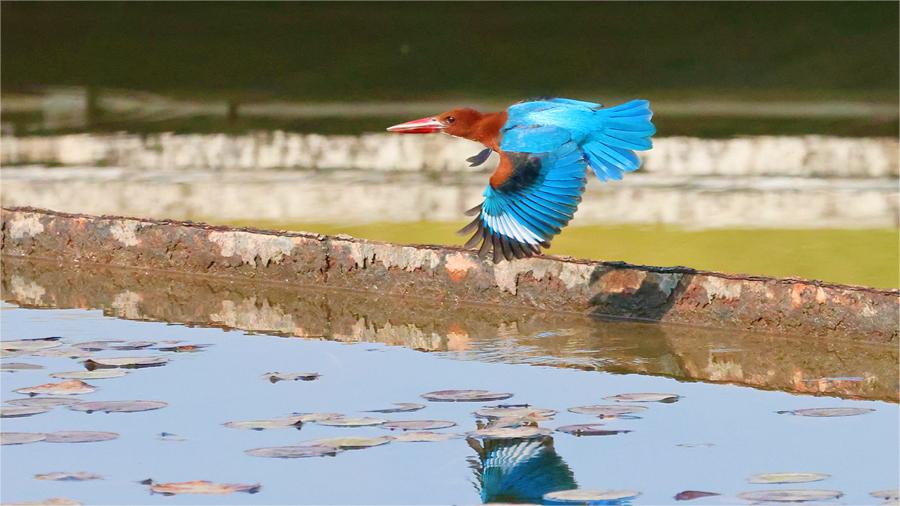Feature: Rejuvenating a "Rust Belt" city of China through sports
BEIJING, Jan. 19 (Xinhua) -- Fuxin, a typical resource-dependent city in northeast China, once thrived with coal mining. However, with the exhaustion of resources, it is now undergoing a transformation.
Today, people in this city are exploring new opportunities for their future.
MINE: MEDAL OR SCAR?
Standing at the edge of a giant pit named "Xinqiu", Jiang Changli, the Chairman of Fuxin Automobile and Motorcycle Sports Association, envisioned the area's future with great enthusiasm.
The vast pit has been transformed into a racetrack known as 100SDC. Representative products of modern industry, like cars, now speed through the ancient rock walls, which boast a history of over a hundred years.
In fact, the massive open-pit mines within the city provide a window into Fuxin's past as a former resource-driven city in Liaoning.
"Xinqiu" is not the only pit in this city. The "Haizhou" mine was once the city's pride, being the largest open-pit mine in Asia. It made significant contributions to the country's economic development and saw the growth of China's coal industry.
From 1953 to 2003, the Haizhou mine produced a total of 210 million tons of coal for the nation. This figure is staggering, equivalent to filling over 5,400 kilometers of train cars - almost the length of the Yellow River.
During that time, the urban economy flourished, attracting many to the city. The "Haizhou" mine even appeared on the back of the 1960 version of the 5-yuan RMB note.
However, due to resource depletion, coal mining enterprises in Fuxin began shutting down in the 1980s, prompting young people to leave the city in search of employment and better lives.
Only the memories of history, the massive mine pits, and coal gangue mountains remained.
Abandoned coal gangue not only occupies land but also contains sulfides that pollute the air and water, posing a risk of spontaneous combustion and generating large amounts of dust. They are like scars on the city's landscape.
A few years ago, Jiang Changli, a car and motorcycle enthusiast, ran a lap in the pit. After completing the race, he declared that the venue was "bad" in a way that was "so good". This statement sparked an innovative idea.
In 2018, Fuxin embarked on a journey to transform the abandoned mines. What was once a quiet and desolate landscape has now become a racetrack radiating speed and excitement.
The track has attracted many drivers from across the country, and even a music festival has been established here. The long-silent mining pit now draws a large number of tourists, fueling local tourism and economic development.
Now, many other "Fuxiners" are also striving to rejuvenate their hometown in their own ways.
BASKETBALL: WORLD AND HOME
In the 1950s and 1960s, the prosperity of coal mines in Fuxin attracted many young people, leading to the flourishing of basketball.
Almost every enterprise had its own basketball court, and workers often played after work for entertainment.
Nowadays, although the former miners grow older, basketball remains a constant.
The new generation of Fuxin residents is carrying on the city's basketball tradition in their own way.
Born in Fuxin, Yao Yipeng has been immersed in basketball since childhood. The post-90s generation currently manages a local basketball club.
Due to his basketball talent, after graduating from junior high school in 2007, he traveled to Canada and successfully attended St. George's Secondary School and York University, both renowned for their basketball programs.
During his time at school, he became a key player on the school team and helped the school win first place in a basketball league in British Columbia, Canada.
Because of his outstanding performance, Yao Yipeng earned a nickname from his teammates: "Big Yao," similar to China's legendary basketball player Yao Ming.
Eight years later, after graduating from university, Yao faced a tough decision: stay in Canada or return to China.
"But I have a basketball dream in China," said Yao.
Basketball brought him to Canada, enabling him to see the world and enrich his experiences.
Then, Yao Yipeng believed that it was time for him to give back.
"Let Chinese children go to the world through basketball, and let the world know Chinese teenagers through basketball" is his original intention and also a reflection of Yao's own life.
In order to provide systematic training for children, he founded a basketball club called "Magic Eagle."
"Perhaps one day, the children who come out of our city can step onto the CBA or even NBA court," Yao Yipeng said.
Currently, his basketball club has more than 1,000 registered members, most of whom are children.
HOMETOWN: A PLACE OF BIRTH AND REBIRTH
Yao Yipeng's decision to "return to hometown" was a calculated choice.
But for Wang Haibo and his wife, it was a matter of necessity rather than choice.
Once professional wrestlers, they retired from their respective teams and left Fuxin in their early years for Shenyang and Beijing.
After retiring from the professional circuit, Wang traveled the length and breadth of the country, participating in mixed martial arts (MMA) events to earn a livelihood.
However, they knew the high income came with high risks. When the couple decided to start a family, they returned home to settle down.
Returning from the bustling cities, Wang initially found himself at a loss, both in terms of his life and his hometown.
Facing a moribund city with limited opportunities, he was uncertain about how to provide for his family.
But as wrestlers, they knew that as long as they didn't stay down, they hadn't lost.
Wang Haibo didn't give up. He was always on the lookout for opportunities to turn his life around.
Fortunately, the opportunity finally presented itself.
In recent years, the government has been promoting Bokh (Mongolian-style wrestling) in primary and secondary schools in a county of Fuxin.
This presented a perfect opportunity for Wang and his wife, who have extensive professional wrestling experience.
By this chance, they became part-time coaches at several local schools.
Through this endeavor, they gradually established a stable income. They saved enough money to open their own wrestling club.
The couple also took online courses to further their knowledge and obtained relevant qualifications to better instruct their students.
In 2023, they welcomed their second child and acquired a car, indicating a significant uptick in their quality of life.
Wang reflected on their initial challenges upon returning to Fuxin, saying, "There is no life without setbacks, but the key is to rise again after falling."
This is a sentiment he and his wife now instill in their students through wrestling training.
He passionately added, "My experience, just like our city, is a testament to resilience. Fuxin is a tenacious and unyielding place, always pushing forward. As long as we have unabated hearts, I firmly believe that our hometown has a bright future ahead."
Photos
Related Stories
- Yearender: Mass sports in bloom across China
- Yearender: China's sports industry seeks development amid transformation
- China's Gu Ailing advances to World Cup U-shaped Field finals with 94.75 points in second round
- Chinese snowboarder Su Yiming bags gold at Big Air World Cup
- Xinhua sports photos of the week
- Xinhua pictures of the year 2022: Sport
- Roller-chairs! Older men create new roller sport
- China's Feng Bin claims discus throw title at worlds
- China's Feng wins women's discus throw gold at World Championships
- Team China aiming high at worlds
Copyright © 2024 People's Daily Online. All Rights Reserved.









